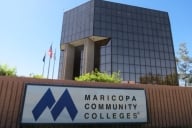You have /5 articles left.
Sign up for a free account or log in.
Some California State University professors might not even know it’s there. But a little clause in their union contract, Article 10.26K, about the possibility of promotion by arbitration, recently helped one faculty member get the title he'd been counting on for years: full professor.
"This will certainly be new to some people, that this process even exists, and that it even works sometimes,” said Ramon Castellblanch, a newly appointed full professor of public health at San Francisco State University. “That’s why I’d like this story to get around.”
Castellblanch, whose research centers on health policy in state politics, started at San Francisco State in 2002. Four years later, various levels of faculty and administrative reviewers determined that he had performed “significantly” in the areas of research, teaching and service, enough to earn tenure and be promoted to associate professor, and he was promoted, according to an independent arbitrator’s report.
Six years after that, during the 2011-12 academic year, Castellblanch applied for full professor. He’d published a book and performed extensive service inside and outside the university, and his teacher evaluation ratings were at the same level they were when he’d attained tenure, he said. So Castellblanch felt confident in his chances of getting promoted, given that the department’s retention and promotion criteria for full professor – the only criteria he said he ever saw – state that a faculty member should show he or she “has maintained a strong record of teaching effectiveness, professional achievement and growth, and contributions to community and campus since her or his last promotion.”
The department procedure continues: “Essentially, the criteria for promotion to full professor are an extension of – the same as – the ones from assistant professor both in terms of quality and quantity.”
Working off of that policy, the department’s retention, tenure and promotion committee recommended Castellblanch for promotion, finding his teaching “significant,” his professional achievement and scholarship as “superior,” and his service as “superior” – similar or better ratings than his first round before the committee six years earlier.
But Castellblanch’s department chair, Mary Beth Love, recommended against his promotion, finding his teaching and professional achievement to be “non-significant,” according to the arbitrator’s report. At the next level of review, the College of Health and Social Sciences, the dean said he shared many of Love’s concerns, according to the report, and also did not recommend Castellblanch for tenure.
Castellblanch contends the teaching assessment was based only on a letter from two students unhappy with his teaching that Love had received years earlier, not on his teaching ratings as a whole. The professional achievement assessment, he said, was based on the fact that Love had determined his book, Driving Down the Cost of Drugs: Battling Big Pharma in the Statehouse, published in 2012 by First Forum Press, a division of Lynne Rienner Publishers, had already been counted in his initial tenure application. But at that time it was unpublished and only one chapter of seven was completed.
Love did not return a request for comment.
At the next level of review, a university-wide retention, tenure and promotion committee found Castellblanch’s teaching, scholarship and service to be “significant” and recommended his promotion to full professor. But up one more level – to the provost and vice president for academic affairs – Castellblanch was turned down, for lacking significant teaching effectiveness and professional achievement and growth (his service was not questioned).
Ultimately, the university president – with whom decision-making authority rests – sided with the department chair, the provost and vice president for academic affairs, and against both faculty committees, denying Castellblanch the rank of full professor.
Castellblanch was surprised by the decision and contacted the California Faculty Association, affiliated with the American Association of University Professors, National Education Association and Service Employees International Union. He filed a contract grievance, which resulted in a meeting with a university lawyer. Following the meeting, the university did not reverse course on its decision, so Castellblanch decided to pursue an option he’d only heard about once before within the California State system: promotion through arbitration.
Under California Faculty Association contract’s Article 10.26K, an independent arbitrator may “correct violations of procedure or arbitrary, capricious or discriminatory decisions by a president” if the arbitrator finds “on a preponderance of evidence that a procedural error occurred” and was prejudicial to the faculty member. The arbitrator can’t substitute his or her judgment for the president’s but may “correct violations of procedure on arbitrary, capricious or discriminatory decisions.” Arbitrators are assigned to cases in accordance with American Arbitration Association rules.
The arbitrator may order a new review. Or, where a lack of “reasoned judgment” has been demonstrated and the professor otherwise would have been promoted, the neutral third party may remedy the situation on his or her own.
Experts say such clauses, where they exist, rarely make way for the promotion of a professor, since the scope of arbitration often excludes review of “academic” matters, and when arbitrators do review promotion decisions, they usually push them back for reconsideration. (And that’s mainly at unionized campuses; non-unionized campuses usually have internal review processes calling for hearings before faculty committees.)
“Even when there are no restrictions on what can be brought before an arbitrator, it’s very common, though for the sole remedy to be a remand for reconsideration,” said Mike Mauer, senior labor adviser for the AAUP.
Alice Sunshine, a spokeswoman for the California Faculty Association, said promotion via arbitration within the system specifically is “not a common case,” and that arbitration more often stems from tenure denials -- where there's even more at stake.
Castellblanch estimated his odds with the arbitrator as “50-50, but you’ve still got a shot,” he said. “I wanted to go in front of somebody who’s got no skin in the game.”
The California Faculty Association, which represents part- and full-time faculty, filed a grievance on Castellblanch’s behalf, alleging that the university hadn’t applied the relevant guidelines for evaluating promotion, among other complaints.
Most importantly, the union argued that the university didn’t follow the “relevant” guideline that the professor maintain the level of achievement he had reached for tenure and promotion to associate professor, and “instead applied their own and more rigorous standard,” according to the arbitrator’s report.
Essentially, the union argued, the university was working off two different standards in assessing Castellblanch – although only one standard, the department-level standard of maintaining one’s performance, was known to the professor. The department committee said that a candidate had to maintain performance in the three key areas, and the university seemed to be saying that he had to improve.
Since Castellblanch’s promotion denial, he said the university and its legal team were pointing to another university policy saying that “Achievements in current rank should demonstrate promise of meritorious activities comparable to the achievements and services expected of faculty who serve at the rank to which the individual is to be promoted.”
The policy continues: “The intensity of the evaluation process will vary in accordance with the academic position of the faculty member; thus promotion to professor requires more rigorous application of standards than promotion to associate professor.”
The university argued that it was not in violation of the contract and that it had followed a “thoughtful and careful decision-making process that complied with university procedures,” the report says.
The AAUP has no policy regarding what is required for promotion and accepts that standards vary by institution, said Greg Scholtz, director of tenure, academic freedom and governance for the organization. But AAUP does say that those standards should be communicated to the faculty member “clearly and early.”
And the arbitrator agreed, pointing to another contract clause guaranteeing faculty members the right to be “apprised in advance” of promotion, tenure and retention criteria. He notes in his report that while he cannot judge the value of Castellblanch’s academic file, the evidence record “fails to indicate the foregoing interpretation of department policy was available to [Castellblanch] at the time of his [file] preparation.”
“Even highly intelligent members of the department’s faculty may thus be understandably confused when advised their promotions to full professor may be denied on the basis of a criterion requiring a ‘more rigorous application of standards.’ ”
The report also points to another section of University Policy, which says that it’s up to administrators to “ensure” annually that “special [department-level] procedures” for promotion, tenure and retention are consistent with university-level procedures and the faculty contract.
Consequently, the arbitrator found that San Francisco State “directly wronged” Castellblanch, and that the only remedy was promote him immediately, with retroactive pay.
Ellen Griffin, a university spokeswoman, declined to comment on Castellblanch’s case, saying it was a private personnel matter. But she said the university has about 800 tenure-line professors, and that there is a denial of promotion arbitration “every couple of years.”
Castellblanch said he’d heard of only one other professor who successfully gained a promotion this way, and that he probably wouldn’t have pursued the option at all if it hadn’t been for that example – so he wants to share his story.
“So there is sometimes justice in this world and I don’t need to assume that I’m simply working at the whim of a chair or somebody like that,” he said.
Beyond the symbolic victory, there’s a 7.5 minimum percent raise coming Castellblanch’s way, and he can finally tell his hard-to-impress mother he’s a “real” professor, he said.









